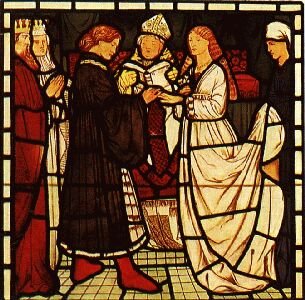
I posted the following on marriage at Susan Russell's blog today. Susan is the president of Integrity and will be leading the effort for Integrity and the Consultation at General Convention to oppose "The Three R's." She runs an interesting blog and is currently posting from Washington DC where she participated in a protest against the Marriage Amendment before the Senate. Susan, an Episcopal Priest in the Diocese of Los Angeles, married her female partner last February at All Saints, Pasadena. She is the person who told the press after Gene Robinson's endorsement by the House of Bishop's at General Convention 2003 that it was "Easter Day." She supports "full inclusion" of gays and lesbians to marry one another - not only in civil society but in the Episcopal Church, as she has done.
In response to her posts about her opposition to the Marriage Amendment, I wrote this today:
The good news is that we aren't talking about "Same Sex Unions" anymore. We're talking about marriage, which is what this was all about in the first place. The whole same sex unions thingy was odd - a second-class status for people who were claiming full inclusion. It's always been about marriage.
Now at least we're speaking plainly that we are addressing what is the true nature of this social and sacramental institution, marriage. I know we love to compartmentalize our life between what is civil and what is sacred (the old "wall of separation" thingy) but marriage is both a sacramental as well as a civil contract. We can wave "same sex blessings" or "same sex unions" goodbye because on this point, Andrew Sullivan was right. It's disingenuous.
So - are the Scriptures clear about what constitutes marriage? That's one question (I think the Scriptures are clear).
The next question then is, does it matter what the Scriptures say about marriage? I think it does (but the Episcopal Church has been clear by its actions that it does not - we have the opportunity to repent of those actions and reaffirm Lambeth 1.10, but is that truly what the Episcopal Church wants to do? I am not so sure).
Finally, what is the benefits of marriage in civil society? Is it healthy for society to promote marriage - and if so, does really matter what or who gets married? What issues are raised by society endorsing same sex marriage? There are health issues (though this is more for gay men than lesbian women since the, er, plumbing is different) - sorry I need to mention it, but we do have to take off our rose color glasses and speak plainly). Perhaps we will find the health risks worth the benefits to society - or will health care industry have a few things to say about the gay lifestyle as it is actually practiced? WIll straights want to pay for the added health risks? When we take off the rose color glasses, are we ready for what we may see? Are we ready now to do that?
Obviously, civil society does draw limits (no one is permitted to marry children or your pets or your light bulb) so we do have limits. If a spouse commits adultry - it not only hurts the marriage, but there is damage to society (more health risks and the breakdown of the family structure). Adultry is not tolerated as a healthy alternative in marriage - so yes, there are limits.
But now we are examining whether marriage in civil society should have those limits lifted, especially amongst consenting adults. For homosexuals, this means that they can marry within their gender. For those in the Mormon tradition, it may mean acknowledging their historic and sacred practice of marrying multiple partners. Perhaps for bisexuals it will mean marrying one or more of each. Perhaps it's a lifting of the prohibition against adultry. But the question for society is how does marriage benefit society and what limits should we enforce? How do we define marriage?
For those of us who are evangelical Episcopalians, our starting place is Scripture - and that is why this particular issue is the presenting issue. The question that is before the Anglican Communion is whether the Episcopal Church still places the same foundational authority in Scripture and the role of revelation in our common life together.
Joseph Smith thought he had a revelation from God that men could have more than one wife. General Convention believes they have a revelation from God that men can marry men and women can marry women. The Anglican Instruments of Unity continue to maintain that marriage is between one man and one woman. All cannot be right - someone is wrong. Who is it?
Marriage is both civil and sacramental. Decisions in one area affect the other. There is no wall of seperation when it comes to marriage. It goes deep to the very nature of our identity, not only in the Church but in our common life together as a nation and globally.
Is our journey one of new revelation or cultural reinvention? For those of us who are Episcopalians, we shall find out.
bb

No comments:
Post a Comment